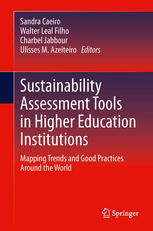

Most ebook files are in PDF format, so you can easily read them using various software such as Foxit Reader or directly on the Google Chrome browser.
Some ebook files are released by publishers in other formats such as .awz, .mobi, .epub, .fb2, etc. You may need to install specific software to read these formats on mobile/PC, such as Calibre.
Please read the tutorial at this link: https://ebookbell.com/faq
We offer FREE conversion to the popular formats you request; however, this may take some time. Therefore, right after payment, please email us, and we will try to provide the service as quickly as possible.
For some exceptional file formats or broken links (if any), please refrain from opening any disputes. Instead, email us first, and we will try to assist within a maximum of 6 hours.
EbookBell Team

4.4
72 reviewsThis book contributes to debates on current sustainability practices, with a focus on assessment tools as applied in higher education institutions. These institutions are challenged to carry out management, research, and teaching, and to create settings that allow developing new competencies to address the complex global environmental, social, cultural, and economic pressures with which current and future generations are confronted.
The first chapters discuss issues of sustainability in higher education, namely the role of universities in promoting sustainability and the emergent fields of sustainability science and education for sustainable development and how to integrate and motivate sustainability into the university. Subsequent chapters present examples of sustainability assessment tools specifically developed for higher education institutions, such as the AISHE – Auditing Instrument for Sustainability in Higher Education, the GASU – Graphical Assessment of Sustainability in Universities too, the STAUNCH – Sustainability tool for Auditing Universities Curricula in Higher Education. The use of other integrated tools are also presented. The papers have adopted a pragmatic approach, characterized by conceptual descriptions, including sustainability assessment and reorienting the curricula, on the one hand, and practical experiences on the other, with good practices from different edges of the world.
Sustainability Assessment Tools in Higher Education Institutions will be of interest to graduate student, lecturers, researchers, and those setting university policy.